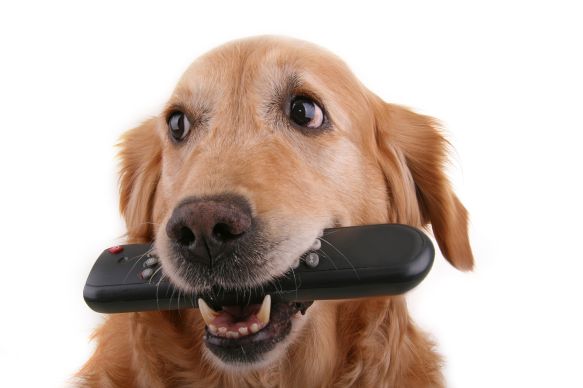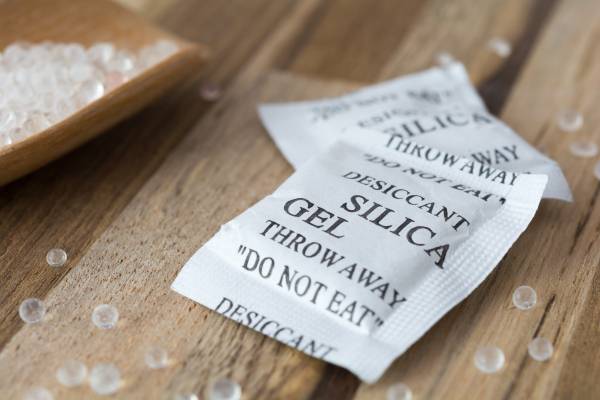Do you have more than one remote control in your living room? If so, you’re not alone! Many families have several remote controls to run various types of electronics in their homes. Remotes are used for the TV, the satellite, cable and other types of set top boxes, sound systems, and more! So, it’s no wonder that dogs seem to have developed a fondness for chewing remote controls!
Connect with a verified veterinarian in minutes. Licensed vets are available 24/7 to answer your questions. No need to worry about your furry family member.
For some reason, dogs are attracted to remote controls of all makes, sizes and shapes. Some experts believe the remote’s shape may remind the dog of one of their chew toys. Others believe the remote smells like their pet parents, so dogs are naturally attracted to them. But why do dogs chew remote controls?

Dogs Chew Remotes for Different Reasons
As mentioned earlier, a remote may be similar in shape and size to a chew toy. So, it would follow that a dog could become confused about whether or not it is his toy.
Dogs may also decide to chew on items that belong to their favorite people. Has your dog ever gone after your shoes, slippers, underwear, etc.? That’s because these items smell like you, and he wants to be close to you. That’s a funny way for dogs to show their love and devotion, but it’s natural canine behavior.
Dogs love to chew! This is a behavior that comes from our domesticated dogs’ wild ancestors. Plus puppies will chew when new teeth are coming in. Grown dogs may chew things up due to separation anxiety or boredom.
Is Chewing the Remote Bad for my Dog?
In short, yes. Chewing the remote means that it’s possible for a dog to swallow small bits of plastic, chew through batteries, and more.
Plastic bits can be sharp and cause cuts in a dog’s mouth and throat, or even in the stomach and digestive tract.
Batteries contain acids that can burn your dog’s skin and mucous membranes. For instance, many alkaline batteries contain potassium hydroxide or sodium hydroxide. These are substances that can cause liquefactive necrosis (cell death) when they come in contact with tissues.
Do not induce vomiting unless this action is recommended by your veterinarian. Your fur baby may have damaged the remote’s battery, which can cause corrosive burns to his esophagus and throat. A lithium battery could also become lodged in the esophagus or cause an electrical injury.

Review symptoms, medications & behavior to keep your pets healthy with a Vet Online in just minutes.
Ask a Vet Live NowWhat Should I Do If My Dog Ate the Remote?
First, remember to stay calm. Remaining calm is the best way to help your dog. Next, don’t holler at your dog; doing so only makes you and your dog more stressed. Being calm helps your fur baby stay calm, too.
Next, look inside your dog’s mouth and check for any plastic pieces from the remote. These may be caught in his teeth or gums. You may also notice some injuries that are bleeding. If your fur baby has chewed the remote’s battery, you could also see tissues that look as if they’ve been burned. The burns are caused by the chemicals contained in the battery.
For these reasons, if your fur baby happens to chew up a remote control and you can’t account for all the pieces of the remote or the batteries, then it’s time to call the vet. This could be a medical emergency.
How to Keep the Remote from Your Dog
Do you wonder how many dogs eat remotes? You’ll be surprised! In an article in Parade, Charlie Waters, a customer service director at Remotecontrols.com, “dog ate remote” is the second most common reason (behind “I lost it”) reason their customers give when ordering a remote control.” He goes on to say, “The average living room has four remotes just in” the living room. When you consider there are about 89 million dogs living in US homes, you won’t have to wonder if this is a common problem!
So, you’re not alone if your fur baby loves to eat remotes! But there are some things you can do:
- Train your dog: this is one of the best ways to protect your remotes. Most canines respond best to positive reinforcement training methods.
- Dog-proof your house: you can also try to dog-proof your home. This method is similar to baby-proofing your house. It’s necessary to cover or put everything out of your fur baby’s reach, including the remote!
- Chew toys: ensure your dog has plenty of appropriate chew toys. What do we mean by appropriate? Chew toys should be the right size for your dog, and they should also be of the right “toughness.” If your dog is a huge chewer, the best toys are those that are said to be “indestructible.” Giving your dog toys to chew on may curb his need to chew on the remote.
Finally, the best way to avoid your dog chewing up the remote controls is through training. The training is for you and your family to learn to keep remote controls in places where your dog can’t reach!
Connect with a verified veterinarian in minutes. Licensed vets are available 24/7 to answer your questions. No need to worry about your furry family member.

Gemma Cliffin BSC BVSC MRCVS
This article has been reviewed and approved by an independent Veterinarian: Dr Gemma Cliffin MRCVS is an experienced small animal vet who combines her love of writing alongside working in practice. Since her graduation from the University of Liverpool in 2014 she has worked in a wide variety of roles including first opinion practice, as a night vet and as a locum vet. She has also spent time working at a charity clinic in the Cook Islands which was a challenge but also immensely rewarding. She loves all aspects of veterinary work, but she especially enjoys medicine cases and diagnostic imaging. She is passionate about pain-management, particularly in her more senior patients. She currently works in a first opinion small animal practice in North Yorkshire where she deals with both routine and emergency cases.
Review symptoms, medications & behavior to keep your pets healthy with a Vet Online in just minutes.
Ask a Vet Live Now





